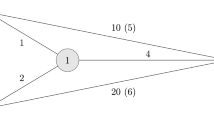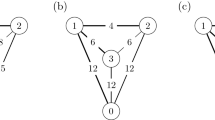Abstract
The cost allocation problem of setting charges to the users in a given network is considered with the aid of minimum cost spanning trees in the network. In addition, the bankruptcy problem of dividing the estate of the bankrupt concern among the various creditors according to their claims is treated. The paper aims to establish that, under certain circumstances, the bankruptcy problem can be seen as a minimum cost spanning tree allocation problem. In the game theoretic setting, the paper provides the conditions on the estate and the claims which are sufficient and necessary for the representation of bankruptcy games as minimum cost spanning tree games. Finally, it is shown that a particular cost allocation rule for the minimum cost spanning tree allocation problem agrees with a certain division rule for the bankruptcy problem.
Access this chapter
Tax calculation will be finalised at checkout
Purchases are for personal use only
Preview
Unable to display preview. Download preview PDF.
Similar content being viewed by others
References
H.F.M. Aarts and T.S.H. Driessen, “A survey on minimum cost spanning tree games,” Working Paper No. 1003, Department of Applied Mathematics, University of Twente, Enschede, The Netherlands, 1991.
H.F.M. Aarts and T.S.H. Driessen, “On the core-structure of minimum cost spanning tree games,” Working Paper No. 1085, Department of Applied Mathematics, University of Twente, Enschede, The Netherlands, 1992.
R. J. Aumann and M. Maschler, “Game theoretic analysis of a bankruptcy problem from the Talmud,” Journal Economic Theory 36 (1985) 195–213.
C. G. Bird, “On cost allocation for a spanning tree: a game theoretic approach,” Networks 6 (1976) 335–350.
I. J. Curiel, M. Maschler and S. H. Tijs, “Bankruptcy games,” Zeitschrift für Operations Research A 31 (1987) 143–159.
T.S.H. Driessen, Cooperative games, solutions and applications, Kluwer Academic Publishers, Dordrecht, The Netherlands, 1988.
D. Granot and G. Huberman, “Minimum cost spanning tree games,” Mathematical Programming 21 (1981) 1–18.
D. Granot and G. Huberman, “The relationship between convex games and minimum cost spanning tree games: a case for permutationally convex games,” SIAM Journal of Algebraic and Discrete Methods 3 (1982) 288–292.
D. Granot and G. Huberman, “On the core and nucleolus of minimum cost spanning tree games,” Mathematical Programming 29 (1984) 323–347.
B. O’Neill, “A problem of rights arbitration from the Talmud,” Mathematical Social Sciences 2 (1982) 345–371.
Author information
Authors and Affiliations
Editor information
Editors and Affiliations
Rights and permissions
Copyright information
© 1994 Springer-Verlag New York, Inc.
About this chapter
Cite this chapter
Driessen, T.S.H. (1994). Relationships Between Bankruptcy Games and Minimum Cost Spanning Tree Games. In: Megiddo, N. (eds) Essays in Game Theory. Springer, New York, NY. https://doi.org/10.1007/978-1-4612-2648-2_5
Download citation
DOI: https://doi.org/10.1007/978-1-4612-2648-2_5
Publisher Name: Springer, New York, NY
Print ISBN: 978-1-4612-7621-0
Online ISBN: 978-1-4612-2648-2
eBook Packages: Springer Book Archive




